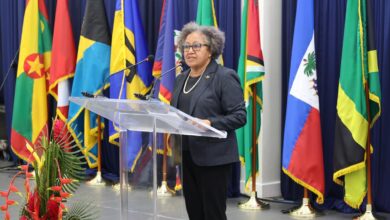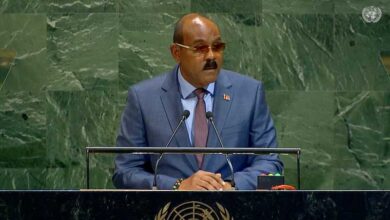The Chairman of the Conference of Heads, the Hon. Dickon Mitchell, Prime Minister of Grenada, recently signalled the concern of Heads of Governments when, four weeks ago, he delivered a statement encouraging citizens of CARICOM Member States to be vigilant following the Mpox outbreak, and as a Council of Health Ministers, it is incumbent upon us to establish a robust and to the extent possible, impenetrable membrane comprised of sound policy, realistic plans, implementable decisions and rigid action to secure the protection of our citizens.
DR ARMSTRONG ALEXIS, CARICOM DEPUTY SECRETARY-GENERAL
– Hon. Minister Cassanni Laville of Dominica, Chairman of the 47th COHSOD-Health and Minister of Health, Wellness and Social Services of Dominica
– Other Esteemed Ministers of Health
– Permanent Secretaries, Chief Medical Officers and other esteemed delegates from Member States and Associate Members
– Dr Jarbas Barbosa, Director of the Pan American Health Organization, and his team from PAHO/WHO
– Dr Juan Manuel Sotelo, Program Director of the Caribbean Sub-regional Office of the Pan-American Health Organization/ World Health Organization, ad interim
– Dr Rhonda Sealy, Assistant Director of the Pan American Health Organization, and the team from PAHO/WHO and other PAHO Colleagues
– Dr. Lisa Indar, Ad Interim Executive Director of the Caribbean Public Health Agency (CARPHA) and other CARPHA colleagues
– Mrs Helen Royer, Director, Human Development and CARICOM Secretariat Colleagues
Good morning.
I am honoured to welcome all esteemed participants of the 47th Meeting of the Council of Human and Social Development – Health, convened here in Washington, D.C. and extend cordial greetings on behalf of Dr Carla Barnett, Secretary General of the Caribbean Community. I also apologize for the absence of Ms Alison Drayton, Assistant Secretary General, Directorate of Human and Social Development, who, due to unforeseen circumstances, could not be with us today.
Having carefully reviewed the agenda for today’s meeting, I am confident that the matters being brought before Hon. Ministers are centrepieces for advancing the Public Health agenda in the Caribbean. You are all aware of the headwinds we have faced since the last regular meeting of the COHSOD Health in 2023, but notwithstanding the challenges, we, as a Community, have made significant progress in addressing issues of health and regional security.
The Secretariat applauds you for your continued invaluable contributions to the Community’s agenda. Today, however, we are presented with many pressing issues of paramount significance that our esteemed health professionals and experts have deliberated on and have concluded are ready for consideration of Ministers. As in previous COHSODs, we eagerly anticipate robust discussions, policy guidance and decisions on the matters before you as we collaboratively strive to enhance and fortify our healthcare systems and uphold the tenets delineated in the Revised Treaty of Chaguaramas, which are dedicated to safeguarding the health and well-being of the people in the Caribbean Region. The effect of social determinants on our health, functioning, and quality of life must be acknowledged as it is evident that those social determinants are contributing to many social ills, including crime and violence, that are impacting public health, families, communities, and individuals in adverse ways.
You would recall the deep concern that has been expressed by CARICOM Heads of Governments about the high levels of crime and violence in the Region, driven in part by firearms and ammunition trafficking, transnational criminal networks, and a breakdown of social structures, and the impact of crime and violence on young people and children.
In a statement issued following the 47th Heads of Government Conference in July 2024, the Heads of Government reaffirmed their commitment to taking urgent action to protect the citizens of the Region and to ensure safety, security, and public interest by sharing information and strengthening legislation related to firearms offences, violent crime, and bail. The offer by Barbados to host a second Regional Symposium on Crime and Security as a Public Health Issue before the end of 2024 was welcomed by the Conference. The presentation today by Saint Kitts and Nevis Chief Medical Officer Hazel Laws – on behalf of Prime Minister Drew as the Lead Head with responsibility for issues pertaining to Human Resource Development, Health, and HIV and AIDS in the CARICOM Quasi Cabinet – furtherattests to the importance that Heads of Governments have placed on identifying strategic solutions to tackle crime and violence.
It is undeniable that the impact of Climate Change is also becoming increasingly apparent. Our Member States are experiencing more frequent and severe weather events, as evidenced by the devastating effects of Hurricane Beryl. The loss of life and destruction caused by this event serve as a stark reminder of the vulnerability of our Region to extreme weather phenomena. The repercussions of these events extend beyond immediate physical damage, affecting essential resources such as clean water, food security, and healthcare services. Furthermore, the World Health Organization has forecasted a significant increase in climate-related health issues, projecting a rise in mortality rates and substantial economic costs. In light of these challenges, it is imperative for our nations to collaboratively develop and implement policies and initiatives aimed at mitigating the adverse effects of climate change. It is crucial that these efforts are tailored to address the specific needs, vulnerabilities, and circumstances of each Member State. By working together, we can effectively tackle the impact of Climate Change and safeguard the well-being of our citizens.
Esteemed Ministers and colleagues, the Community continues to experience new public health threats continuously. On 14 August 2024, the World Health Organisation (WHO) announced that the upsurge of Mpox in the Democratic Republic of the Congo (DRC) and a growing number of countries in Africa constitutes a public health emergency of international concern (PHEIC) under the International Health Regulations (2005) (IHR). This new threat highlights the need to effectively strengthen pandemic prevention, preparedness, and response capacities in the Region. Compounding the seriousness of this situation are the emerging and re-emerging infectious diseases, antimicrobial resistance, ongoing challenges of COVID-19, and persistent threats from diseases such as HIV/AIDS, Malaria, Tuberculosis, and other infectious diseases.
We live in an interconnected global village where people move about quickly and faced with ongoing cross-border travel, the Caribbean is particularly vulnerable to the spread of infectious diseases, which, though not emanating from our Region, can reach us quickly, given our reliance on external travel associated with the healthy tourism sector which forms the backbone of the economies of many of our CARICOM Member States. The Chairman of the Conference of Heads, the Hon. Dickon Mitchell, Prime Minister of Grenada, recently signalled the concern of Heads of Governments when, four weeks ago, he delivered a statement encouraging citizens of CARICOM Member States to be vigilant following the Mpox outbreak, and as a Council of Health Ministers, it is incumbent upon us to establish a robust and to the extent possible, impenetrable membrane comprised of sound policy, realistic plans, implementable decisions and rigid action to secure the protection of our citizens.
In closing, I wish to reaffirm the Secretariat’s commitment to provide the necessary technical and administrative support to ensure policy formulation and implementation, but it is imperative for all of us to remain committed to addressing the pressing issues that impact the health and well-being of the Caribbean Region. By fostering collaboration, sharing information, agreeing on the establishment of region-wide policy, and strengthening legislation at the national level, we can improve the landscape of safeguards that will benefit us and our citizens. The CARICOM Secretariat commends Member States, regional institutions and international development partners on the progress made thus far in improving the health of the Region, and I extend our best wishes for a productive and successful meeting. I am confident that the outcome of this Forty-Seventh Meeting of the COHSOD Health will add to the already impressive regional approach that we are all committed to. We anticipate that this meeting will further catalyse positive change and progress, and as a Community, we will achieve the intended result of securing a viable, sustainable and prosperous Community for all. I look forward to the deliberations of this meeting, and I wish you success as you undertake the important responsibility of advancing the public health agenda of our beloved Region.






